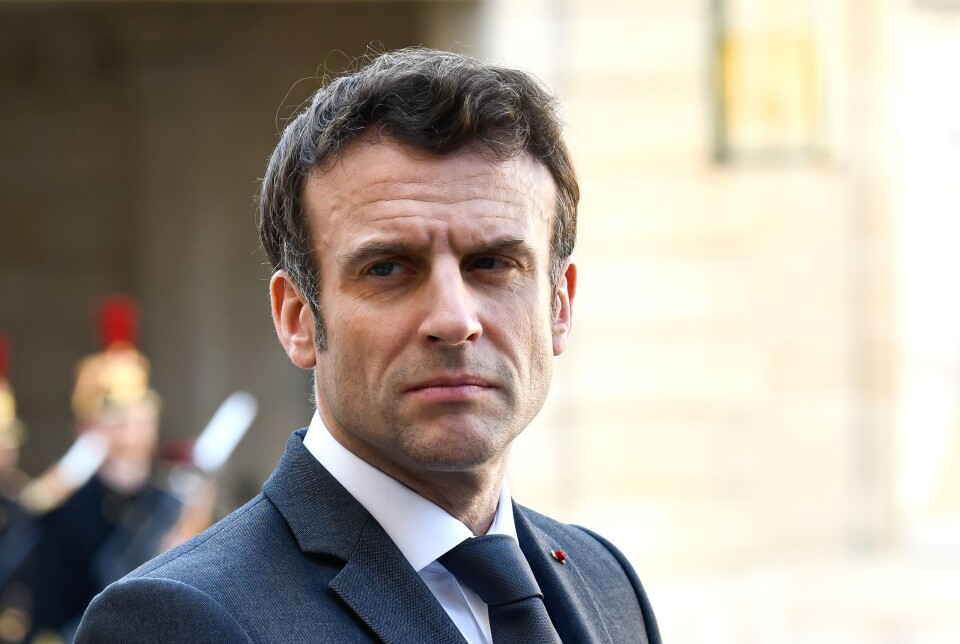-
French banks applying ‘irregular’ charges on clients, fraud office check reveals
The investigation into 100 banking establishments found breaches, failings, and alleged criminal practices
-
New poll: How do people in France view relationship with the US?
The study also asked about Ukraine’s President Zelensky, military aid, and joining NATO
-
President Macron to make a TV speech to nation tonight
The broadcast will address this ‘moment of great uncertainty’ amid international tensions about the war in Ukraine
Macron’s middle-class tax cut plan: Would you be affected?
France’s president said it would likely affect those earning between €1,500 to €2,500 net a month

France’s president Emmanuel Macron says he wants to spend €2 billion to reduce taxes for the middle classes.
We explore what we know so far and how the plans could affect people living in France.
What would the plan include?
The plan is only a suggestion at this stage and has not been made law or even formally proposed.
However, Mr Macron said he envisaged dropping taxes for people who earn €1,500 to €2,500 per month before tax, by 2027.
The president said: “If we want the country to continue moving forwards, we need to restore credibility to work.
“Today, we are helping people who are in distress and the low-paid a lot, but the taxation of middle-class incomes is too high and is accelerating too quickly. It crushes the gains in purchasing power for those who earn between €1,500 and €2,500.
“We must allow the middle classes to live better on their salary and continue to reduce their taxes,” he said.
The president said that all of the income tax rises made by his predecessors from 2010-2014 had been “levied on the middle classes and small business owners”.
Mr Macron added that he would consider the plan “when the budgetary trajectory will allow it within this term”, and said he had “asked the government to bring me proposals”.
Read also: Are you rich? New report defines what ‘rich’ means in France
Who would be affected?
The change could apply to almost 10 million homes across the country. Official statistics show that almost 30% of full-time workers in France earn between €1,500 and €2,000 net, while 18.6% earn between €2,000 and €2,500.
As a result, this measure would apply to almost half of full-time workers.
Journalist David Boéri told FranceInfo: “This [middle class] term doesn’t have an official definition, so this is much more of a political solution than an economic one.”
He suggested the proposals are part of Mr Macron’s efforts to announce more investment and get public opinion back on his side after the controversy and opposition against the pension reforms.
How likely is this to happen?
The measure would likely be very expensive if applied. Mr Macron estimated that the cost would be around €2billion. This would be in addition to the €15billion ‘lost’ by the government when it scrapped the taxe d’habitation for all main homeowners.
Mr Boéri said it would be possible to implement such a plan if the government “lowered the tax rate of the first income bracket, as in 2019, or to review the family amount by doubling the money for the first child”.
The government could also re-evaluate the conditions to access the prime d’activité or reevaluate other benefits, and make them means-tested for slightly higher earners.
As Mr Macron said: “I’ve asked the government to work on it, but I can’t be sure because we could do other intelligent things for part of charges that you pay, or public contributions that you pay when you’re an employee.”
Mr Boéri said: “The improvement in public life must be visible, without causing the public deficit to soar.”
Read also: Taxe foncière, taxe d’habitation: how are these worked out in France?
What else did Mr Macron say?
In an interview on TF1, Mr Macron also:
-
Announced plans to ‘open the door’ to the training of Ukrainian fighter pilots, along with several other European countries. It comes the day after Mr Macron’s dinner with Ukrainian President Volodymyr Zelenskyy. Mr Macron said: “France's strategy is simple: to help Ukraine resist, and to organise, when it chooses, a counter-offensive so it can bring everyone back to the negotiating table, and, under conditions it will choose, build lasting peace.”
-
Pledged his confidence in Prime Minister Elisabeth Borne. Ms Borne has been in the role for one year, but has faced considerable opposition from within the government itself, and only just survived two votes of no-confidence after the imposition of the pension reforms. Mr Macron said that he is “very proud to have named Elisabeth Borne [as PM] a year ago.” He said: “At my side, Elisabeth Borne works with strength, determination, and courage.”
-
Said he was in favour of referendums “if it is useful for the country”. Mr Macron said that some members of the opposition had “denied their responsibilities”, and said that his main political aim is to “try to do what I say I will”.
-
Weighed in on Artificial Intelligence (AI). He said that France must “find a balance between innovation and regulation”. He said: “The anti-NGO model, which tries to ban all research under the pretext that we can’t control all the consequences of a technology, is not for me.” He added that AI could “revolutionise many things” and that “it is better to try to understand it…experiment, test, and understand, and create an incremental and cooperative method [of] regulation”.
-
Said that the education system needs “unity, ambition, and re-engagement”. He said that “we do not want to re-open old wounds” when it comes to social diversity, just as Education Minister Pap Ndiaye has been forced to drop plans that critics said would “re-wage school war”.
Related articles
Must I register side activities for French business taxes and charges?
France taxes at source so why do I have to complete a tax return?
Avoid income tax return errors by understanding the French system
























